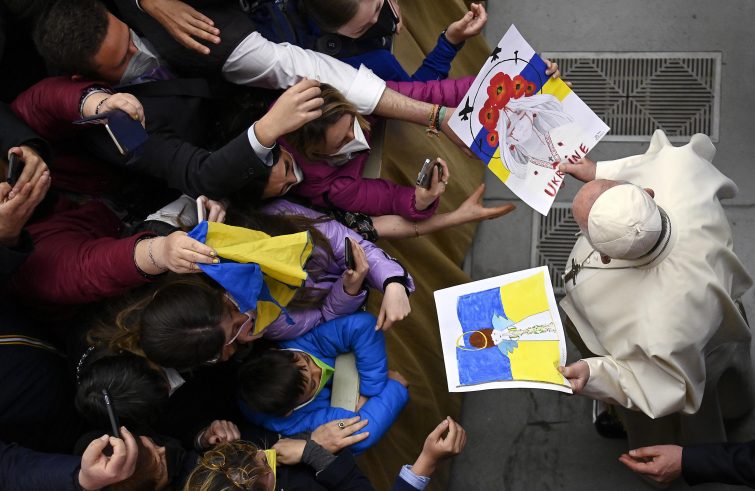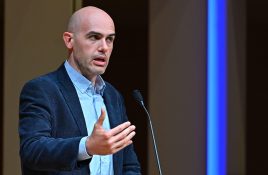
Not even an inch. The two warring parties will not budge, neither on the battlefield nor on negotiating grounds. While busy confirming alliances, Russia and Ukraine are bracing for a long winter of war based on the understanding that they will not alter course. Ukraine’s President Zelensky secured the United States’ green light for the deployment of the Patriot missile system, yet during his visit to Congress, over and above all the rhetoric and a flawless Christmas aura, he had to digest the US reluctance to extend the conflict further. His Russian counterpart responded and condemned the Washington-financed “proxy war”, but could not sit idly by and threatened an offensive against Moldova. In the view of geopolitical expert Dario Fabbri, editor-in-chief of the journal Domino, negotiations are nowhere in sight. The prospect of the Pope acting as mediator is likewise remote. “It was a possibility – he says – but the warring parties are not ready to negotiate. In fact, it’s hard to mediate between unwilling parties.”
Mr Fabbri, the past week was marked by visits: Putin’s visit to Belarusian President Lukashenko was followed by Mr Zelensky’s visit to President Biden. Let us start with the first. How should we interpret it?
Moscow continues pressuring Belarus to open an additional battle front which would distract Ukrainian soldiers and force them to move north. Belarusian troops could distract Kyiv, although they lack the power to decide the fate of the conflict. It remains to be seen whether the Russians manage to involve them in the coming weeks.

Zelensky’s wish list to the US Congress has been fulfilled only in part. In fact, he was granted only the Patriot system.
This other ‘front’ is much more complex. Mr Zelensky was met with substantial resistance from the US political establishment.
The bottom line is that right now, Federal decision-makers in the US don’t feel it necessary to support the Ukrainian resistance ‘indefinitely’.
This is especially true at the Pentagon, where the prevailing view is that the situation in Ukraine will be deadlocked until late spring. That’s why during the visit they pressed Zelensky to envisage some sort of negotiation with Russia starting now, but that’s exactly what Kyiv is unwilling to take into consideration.
The latest surveys found that a third of all US citizens no longer support Ukraine unreservedly.
Furthermore, some of those closest to Trump consider it necessary to reach a modus vivendi with Russia ahead of the final confrontation with China. In their view, it makes no sense to be at war for so long, since sooner or later they will have to do business with Moscow in anti-Chinese key. All of the above reverberated on a complex visit, and it was no coincidence that it occurred before January, when the new Congress will be sworn in.
Russia’s strategic operations to destroy Ukraine’s energy infrastructure are reportedly underway, but no changes have taken place on the battle ground.
The situation is extremely critical. Since the Russians retreated to the other bank of the Dnieper River, they have been managing to maintain their positions. They continue shelling civilian infrastructure in the meantime, leaving Ukrainians in darkness and in the freezing cold for many hours. Nothing has changed for the past month and a half at least.
Negotiations are the only option, but there is no progress in sight.
The Russians are more inclined to negotiate – they are sure that for them the situation can only get worse. The Ukrainians are less eager, because they know they will not recover all of the occupied territories.
Moldova has been dreading Russia’s attack since February 24, and even more so today.
Moldova has been a contested territory for much of its history, with a diverse population. This makes it objectively vulnerable in every conflict. The Russian military is now in disarray and it is unlikely that they will manage to occupy another territory. However, it is possible that they might attack it to divert Ukrainian energies.
Did you ever consider the Pope as a possible mediator?
In Domino’s latest issue we analysed the Vatican’s role in this situation. Pope Francis has restored a more appropriate dimension to the Vatican. Previous popes, John Paul II and Benedict XVI, were largely aligned with the Western front.
By contrast, Francis’ idea of the Vatican is that of an imperial Vatican that is positioned between the empires and does not take sides.
It was the habitual attitude of the pontiffs, which Francis perfectly embodies today when he says that good or bad nations do not exist. He dismisses the idea of US hegemony as good with other empires as outright villains. This stance could have resulted in an obvious mediation on the part of the Vatican.
The point is that the opportunity did not arise, partly because the timing was not right and partly because Francis was not chosen as a mediator by either side.
The Pope opted for a clear intermediate path. He acknowledged the perpetrator and the victim but he did not describe the US approach as that of the rescuer. Washington was not enthusiastic about his stance, but it must be said that it is a typical stance. Since the Cold War, we have grown accustomed to less complex stances on the part of the popes. Conversely, Francis’ attitudeis extremely complex and has in fact been subject to criticism and instrumentalisation.
Could he have been the perfect mediator precisely for these reasons?
He could have been, but the warring parties are reluctant to negotiate. It’s hard to mediate between unwilling parties.
It should be remembered that the western part of Ukraine has a large Catholic population, both Greek and Latin rite Catholics. Likewise, it should be noted that during the siege of the Mariupol steelworks an appeal was made to the Pope, which he accepted by invoking the importance of Christian values and the need to avoid a massacre. A mediation could still take place, provided the two parties agree to it. In a dispute, mediation requires acknowledging the arbitrator, and as far as I can see, there has been no such acknowledgment so far.









